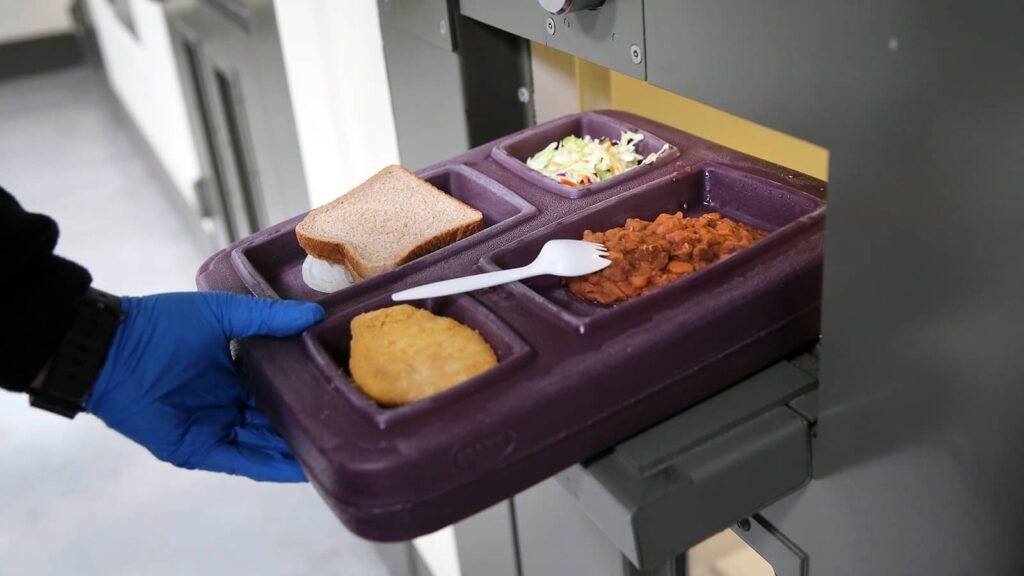For some, keeping kosher is an important part of daily life. However, when an individual is incarcerated in a correctional facility, keeping kosher can be challenging. In this article, we’ll explore whether it’s possible to get kosher food in prison.
What is kosher food?
Kosher food is food that meets the requirements of Jewish dietary laws, known as kashrut. These laws dictate what types of food are permissible and how they should be prepared and consumed. For example, meat must come from certain animals and be slaughtered in a specific way, and dairy and meat products cannot be mixed.
Can you get kosher food in prison?
The answer to whether you can get kosher food in prison depends on the specific facility and its policies. In general, most prisons are required to provide inmates with access to religious dietary requirements, including kosher meals.
However, providing kosher meals can be challenging for prisons. Kosher food requires special preparation and storage to avoid cross-contamination, and it can be more expensive than non-kosher food. As a result, some prisons may have limited options for kosher meals or may require inmates to pay extra for them.
Additionally, inmates may need to apply to receive kosher meals and may need to provide documentation of their religious beliefs and dietary requirements. Some prisons may also limit the number of inmates who can receive kosher meals, particularly if there are limited resources available.
Challenges with obtaining kosher food in prison
Even when prisons offer kosher meals, there can be challenges with obtaining them. For example, some prisons may require inmates to give notice in advance that they want kosher meals, and may not be able to accommodate last-minute requests.
In addition, some inmates may be hesitant to request kosher meals due to concerns about stigma or discrimination. In some cases, inmates may be placed in isolation or segregation if they request kosher meals, which can be isolating and stressful.
Finally, even when kosher meals are available, they may not always be of high quality or nutritional value. Some inmates have reported that kosher meals are often bland and unappetizing, which can make it difficult to maintain a healthy diet.
In addition to kosher food, there are other types of religious foods that may be available in prison to accommodate the dietary requirements and cultural practices of other religions. In this article, we’ll explore some of these options.
Halal Food for Muslim Inmates
Muslim inmates may require access to halal food, which is food that meets the dietary requirements of Islamic law. Halal food must be prepared and consumed in accordance with specific guidelines, such as avoiding pork and alcohol, and ensuring that animals are slaughtered in a specific way.
Similar to kosher food, halal food requires special preparation and storage to avoid cross-contamination, and it can be more expensive than non-halal food. Prisons may offer halal meals as an option for Muslim inmates, but like kosher meals, they may have limited options and require inmates to apply to receive them.
Vegetarian and Vegan Food for Various Religious Requirements
Many religions also have dietary restrictions related to the consumption of meat, such as Buddhism and Hinduism. Some inmates may also choose to follow a vegetarian or vegan diet for ethical or religious reasons. Prisons may offer vegetarian or vegan meals as an option for inmates who require them.
Prisons may also offer vegetarian and vegan meals to inmates who are fasting during religious holidays, such as Ramadan for Muslims or Yom Kippur for Jews. During these times, inmates may need to follow strict fasting guidelines and may require access to meals that meet their dietary requirements once the fast has ended.
Other Religious Dietary Requirements
In addition to specific dietary requirements, some religions have other cultural or religious practices related to food. For example, some Native American religions may require access to traditional foods, such as buffalo or salmon, as part of religious ceremonies.
Prisons may work with religious leaders and community members to identify the specific dietary requirements and cultural practices of inmates and provide appropriate accommodations. This may include access to certain types of food, permission to prepare food in a certain way, or permission to use specific cooking or serving utensils.
While it is possible to get kosher food in prison, the availability and quality of these meals can vary depending on the specific facility and its policies. Inmates may need to apply to receive kosher meals, provide documentation of their religious beliefs, and may face challenges with obtaining high-quality, nutritious meals.
Despite these challenges, it’s important for correctional facilities to provide access to kosher meals as a way to support the religious beliefs and dietary requirements of Jewish inmates. By ensuring that inmates have access to nutritious and culturally appropriate meals, correctional facilities can help support the physical and emotional well-being of Jewish inmates during their incarceration.







